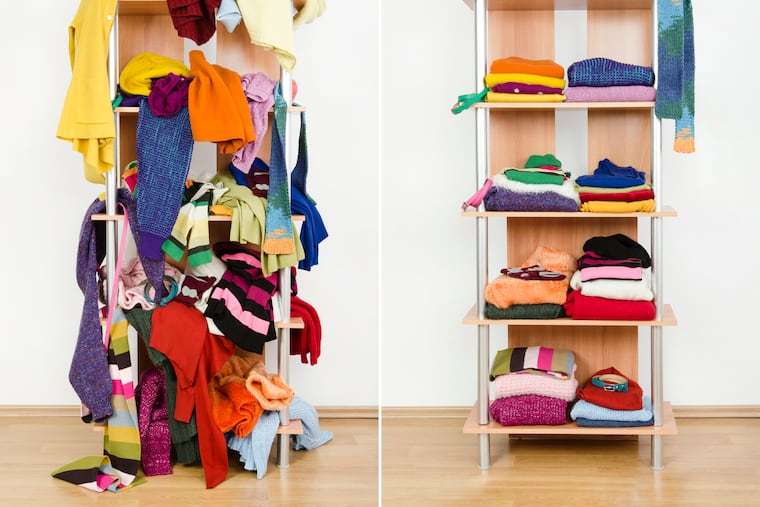How to find a professional organizer to clean up your clutter
10 tips for finding someone who can help clear out and clean up garages, closets, dirty dens — even your email inbox and computer files.

Is your house hopelessly cluttered? Many of us have so much stuff we can’t control it and throw up our hands and let it accumulate — or hide it in drawers and closets.
A professional organizer can help you address such messes. These specialists can help clear out and clean up garages, closets, dirty dens — even your email inbox and computer files. Who are these neatniks for hire, and how should you choose one?
To examine how organizers work and who would (or maybe wouldn’t) benefit from their services, nonprofit Delaware Valley Consumers’ Checkbook asked six staffers and neighbors to try out professional organizers on very different projects, ranging from a junked-up garage to a kitchen that needed a new space-saving scheme to a blind author needing help sorting piles of paperwork.
Until Aug. 5, Inquirer readers have free access to Checkbooks’s ratings of organizers at Checkbook.org/Inquirer/Organizers.
We found that pro organizers offer a wide range of work styles. Some are hands-on, tossing and stacking stuff alongside their clients; others just survey the mess and suggest improvements. What was surprising is that, although we expected organizers to recommend buying expensive furniture, bins, boxes, hooks, and other materials to cram everything into, they were conservative in recommending these purchases.
We were shocked by differences in fees charged by organizers we contacted. A few wanted large retainers and would take on projects only if our subjects agreed to pay for a minimum of eight hours or more of consulting time.
Overall, we find that people who are disorganized or messy tend to get the most benefit from bringing in a pro; tidier folks often agree that organizers provide some ideas and help, but after learning tips on how to tackle their messes, they often doubt they’d shell out again for these services.
Start by assessing whether you really need to enlist an organizer. As is the case with most life challenges, if you suspect you need help, then you probably do.
The National Association of Productivity and Organizing Professionals’ website (NAPO.net) is a great place to start your organizer search. You can search by distance and also specialty, so if you’ve got, say, a kitchen project in mind, you can find an organizer who has a special interest or extra experience in that category. And many organizers’ include their business websites in their NAPO profiles, so you can take a deeper dive from there.
When contacting organizers, ask these six questions:
What kinds of projects do you specialize in? While many organizers are generalists, able to sort through and clean up closets, kitchens, garages, etc., others focus on helping downsizers, scanning photos and other memorabilia, or assisting hoarders.
Do you offer free initial consultations? In person or via video chat is preferable to a phone call.
Will I work with you, or will you assign me to an employee? It’s best to communicate directly with the person who will come.
What do you charge? Some organizers charge by the hour, others by the project. Get in writing the specifics on fees and, if possible, an estimate for your job. Expect to pay anywhere from $75 to $125 an hour, though some organizers offer packages; for example, a closet clean out for $250 or a garage sorting for $350.
Can you provide me with a contract? They’re not too common in this business, but it’s reasonable to ask for at least an email that spells out what the consultant will and won’t do, an estimate of the number of hours to complete your project, how the company calculates charges, and an estimated price.
Can you provide references? Ask for contact info of customers who had projects similar to yours, who live near you, or with other limiting factors that might prevent the company from handing you its usual list of favorite clients.
Four tips to get started
Sort your clutter into categories. Once items are separated that way, it’s easier to figure out what to do with them.
Prioritize moving frequently used items and ingredients to the most accessible spots. For kitchen pantries, clear plastic storage bins in various sizes are great. The ones with high sides are especially handy. They make it easy to shift items while still seeing what you have. Even small spaces can be organized into effective storage areas.
Get rid of things that aren’t worth saving. If you haven’t used something in a long time, get rid of it. If an item is dirty, worn, or otherwise grody, trash it. The extra shelf or closet space is well worth it. If you don’t have time, don’t worry about selling items or donating them in the most optimal way. You can pick a single resources. that offers easy drop-offs.
Professional organizers aren’t miracle workers. Having an outside voice, and another set of hands to dig through everything, can make the job far easier, but you must be willing to pitch in and make decisions.
Delaware Valley Consumers’ Checkbook magazine and Checkbook.org is a nonprofit with a mission to help consumers get the best service and lowest prices. It is supported by consumers and takes no money from the service providers it evaluates.